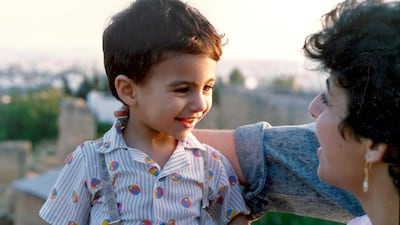It's a sad irony that one of the most topical films at this year's Diff should be a documentary dealing with events that took place 30 years ago. Julia Bacha's Naila and the Uprising, which had its Middle East premiere on Monday, tells the story of the vital work of women's organisations during the first Palestinian Intifada, which began in 1987, and in particular the work of one Palestinian woman, Naila Ayesh, a key activist during the uprising against Israeli occupation. The film will also screen in Palestine tomorrow to commemorate the 30th anniversary of the Intifada.
Ayesh’s story is remarkable. With a newborn child to care for, and a husband deported and living in exile in Egypt, Ayesh remained committed to the cause of Palestinian liberation, even taking her newborn son out on the streets in a sling to ensure vital leaflets and bulletins about the latest freedom-fighting activities were delivered. Her son Majd would even spend a portion of his childhood in prison with his mother when Israeli soldiers dragged her away in the middle of the night with no one else around to look after the infant.
Ayesh attended last night's premiere, where she was given a rock-star welcome by audiences eager to applaud her efforts, but the memories still haunt her: "This is my real story and I live it with pain," she tells The National when the crowds of well-wishers have dispersed. "After all these years I will never forget the pain I had at that time, but I am proud of the work we did to tell this story."
Ayesh felt it was important that she could tell the story in her own words. “It was so important to me as a Palestinian to document this story. As Palestinians, we never seem to document our stories because always our stories seem to be documented by somebody from elsewhere, somebody from outside.”
The film uses plenty of archive footage from the time to drive home the point that so much coverage of the situation in Palestine comes from a – not-always-sympathetic – international media. What is surprising in the movie, however, is some remarkably pro-Palestinian coverage of events from United States news outlets – not something commonplace on US TV in the current era. Producer Suhad Babaa admits it took some research to find the segments, and has a good idea of why such coverage is a rarity. She says: “What you’ll notice is that the coverage is really strong when correspondents like [CBS’] Bob Simon are actually on the ground reporting what’s actually happening. But the reporting often switches when they get home, reporting from their offices. That distance that’s created really has an effect, and segments like those you saw in the film are few and far between. I think it’s really important to have reporters on the ground actually reporting from within communities if we’re going to get that kind of truthful coverage.”
What could have simply been a fascinating historical document has suddenly acquired new urgency since US President Donald Trump’s decision last week to declare Jerusalem the capital of Israel, and talk of an imminent new Intifada in the air. Thirty years on from the First Intifada, and with her homeland still occupied, Ayesh refuses to give up hope.
_______________________
Read more from Diff 2017:
Haifaa Al Mansour won’t get the hump after winning funding for camel movie
Local industry reacts to Saudi cinema opening announcement
_______________________
“We must keep ourselves optimistic,” she says. “This decision of Trump’s must push all the Palestinians, not just Arabs in Palestine but internationally, to show that what he has done is against every international law and against any possibility of a two-state solution. The US was one of the sponsors of the peace talks and the two-state solution, and this is only going to encourage Israel to be more violent, and to take more and more land from the West Bank. Right after his decision they carried on making more settlements.”
Ayesh again emphasises the importance of hearing Palestinian voices in the conversation about the region. “They [Israel] do this and yet the press in the US only talks about the Palestinians using violence against Israelis, and they only interview Israelis. You’re only getting that side of events because they never even talk to Palestinians and ask them what’s happening.”
Having endured such struggles, and with her grown-up son now living in Canada, you could forgive Ayesh for looking to pastures new, but there's plenty of fight in this patriot yet, and she clearly has no intention of throwing in the towel. "I still live in Ramallah," she says, proudly. "I'm proud to be Palestinian and I would never even think to live anywhere other than Palestine, whatever happens. This is my home, always, and I hope through my work and through this film we can help pass the struggle on to the next generation."

